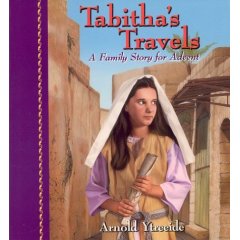Tabitha’s Travels
 Tabitha’s Travels was our Advent read-aloud this year. I learned of it through a posting at our homeschool group site, where it was recommended along with the two other Advent storybooks Arnold Ytreeide has written. The others, Bartholomew’s Passage and Jotham’s Journey, have boy protagonists; Tabitha’s Travels focuses on a girl.
Tabitha’s Travels was our Advent read-aloud this year. I learned of it through a posting at our homeschool group site, where it was recommended along with the two other Advent storybooks Arnold Ytreeide has written. The others, Bartholomew’s Passage and Jotham’s Journey, have boy protagonists; Tabitha’s Travels focuses on a girl.
Whatever mixed feelings I have about it, the girls loved it. It’s a real cliffhanger, and they were totally involved each day as Tabitha’s adventure unfolds. We read it at breakfast, where I seldom got one bite of cereal before the eager pleading would begin. Several times, my youngest ran up the hall to report on the latest plot developments to my husband while he was shaving. There’s a chapter for every day of the Advent season.
Tabitha is a daughter of shepherds — yes, that’s right, the shepherds, to whom the angels eventually appear on Christmas Eve. Tabitha’s travels unfold after her father is arrested by the Romans on false charges, and Tabitha is left alone to make her way among various towns in search of his citizenship papers in order to rescue him. Over the course of her journey she meets Elizabeth and Zechariah, Mary and Joseph, Herod, and, as a convenient segue to the other books in the series, Jotham and Bartholomew. Her tale is full of thrills and chills, kidnappers, malicious Romans, thieves and murderers. As entertainment, it was (judging from the girls’ reaction) quite successful.
So what’s my problem?
I think the basic story of God coming to earth has thrills and chills enough without laying on such a thick coating of fiction, for one thing. It was unfortunate that by the time the angels appear on the hillside, and the Christ child — who, of course, Tabitha actually holds in her arms at one point — is born, they seem like afterthoughts. That’s not to say that the idea of holding the infant Jesus didn’t still make me cry. It’s just that in terms of the story’s construction, the main course is Tabitha’s “one girl against the world” journey, and said journey has been woven of such unlikely and sensational ingredients, the real miracle doesn’t carry sufficient impact. My idea of a truly successful book would have saved the main stage for the true hero.
My other criticism has to do with the girls vs. boys theme. Tabitha’s tomboyishness and independence make her relatable to a modern girl, but they seem totally implausible. The same can be said for the comments her father and Zechariah make about what a shame it is that girls aren’t allowed to study the Torah the way boys can in the Jewish community. On the whole the attempt to create a bridge between a modern Gentile mind and an ancient Jewish one so distorted the truthfulness of the historical picture that I had some misgivings about reading it.
The girls are already anticipating reading about Jotham and Bartholomew next year. Sigh… What to do? I would rather not. But at the same time, I’ve been convicted lately about the way I take strong stands on things that really aren’t that important in the big picture, creating prickly walls around myself but not accomplishing much else. What’s more important here, accuracy or delight? How do I even begin to answer that?
Without being too curmudgeonly, I did raise the issue with the girls of mixing fiction and fact. The same issue turns up when we watch Moses Prince of Egypt — a movie I absolutely love, but one which does make some changes to the Moses story. We talked about the importance of knowing what the Bible says, and being aware of the actual details of a story. Once in awhile we can have fun with adaptations that take some liberties, and they can even help us to notice things in the real story that we wouldn’t otherwise have seen, but it’s important to know the Bible and to acknowledge its authority on the facts.
That’s basically where I come down on it for now. This book gave us a fun way to experience Advent together. It prompted reflection on what it was like to be one of the countless anonymous bystanders going about their ordinary lives when the greatest event of all human history occurred. It took some liberties, but… isn’t this the mindset we’re hoping for during Advent?


